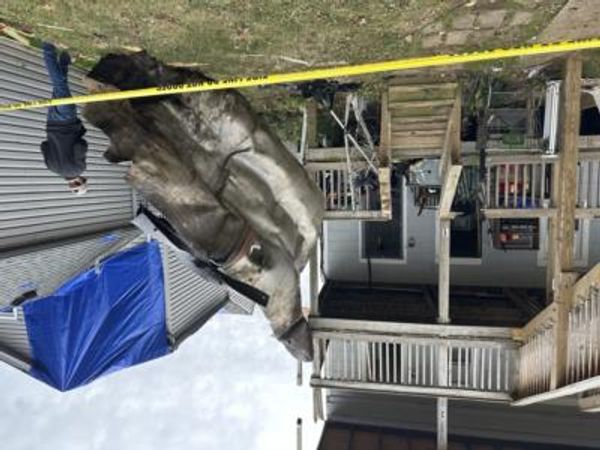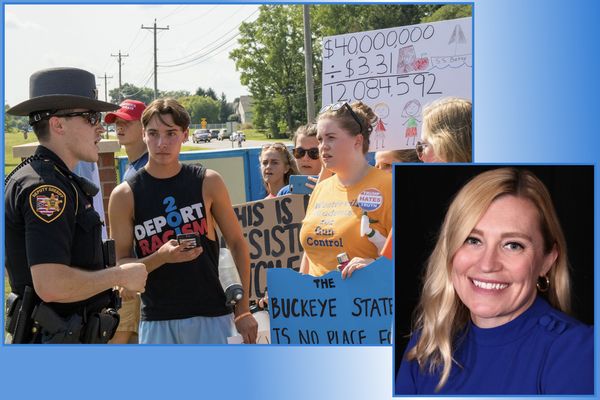
MINORITY GOVERNMENT LOOMS
The week starts with a new poll revealing minority government is the most likely outcome if the next federal election were called tomorrow. The latest Australian Financial Review/Freshwater Strategy poll has the Coalition leading 51% to 49% on a two-party-preferred basis, with its primary vote up to 42% and Labor’s up to 32%.
“If repeated on election day, it would send Labor well into minority,” the AFR declared, saying the government still trails the Coalition when it comes to economic management and national security. However, on voters’ number one issue — cost of living — Labor has apparently closed the Coalition’s lead by five points over the last month (the lead now stands at 35% vs 28%).
The polling sets the scene for what the government hopes will be a busy week in Canberra. The ABC says the Albanese government is confident going into Monday that it can secure the passage of laws to take over the CFMEU and restructure the NDIS this week. The Australian highlights Finance Minister Katy Gallagher saying she was hoping both pieces of legislation would pass the Senate soon and that the government is reportedly also closing in on a bipartisan response to the aged care taskforce report. The paper said it understood the government had agreed to further concessions with the Coalition on the CFMEU bill, including a minimum three-year administration term for branches where wrongdoing is found and more regular reporting to Parliament.
Gallagher admitted on Sunday: “Obviously we would like more legislation passed. Last week wasn’t the most productive week. I’m hoping that this week will be more productive.” Labor is reportedly hopeful the CFMEU bill could pass as early as today following negotiations between Minister Murray Watt and the Coalition over the weekend. It might not be that simple though, with the Coalition’s demands for the bill to include a ban on political donations from the CFMEU declared unconstitutional by the government. The ABC said Watt accused opposition workplace relations spokeswoman Michaelia Cash of “moving the goalposts” over the negotiations.
The broadcaster has laid out the scale of the legislative logjam currently facing the government, with things like the Help to Buy scheme, the Build to Rent scheme, a bill to restructure the Reserve Bank of Australia, plans to lift the tax rate for earnings on super balances above $3 million, and a new environmental protection agency all currently stuck with seemingly no way through. The ABC points out there are only five sitting weeks left this year.
NSW LIBERALS CONSIDER LEGAL ACTION
The incredible story of the NSW Liberal Party missing the deadline to nominate candidates for several councils continued at pace over the weekend with the party claiming it would be left with “no other option” than to take legal action if it was not given more time to submit its nominations, Guardian Australia reports.
After the state’s electoral commission rejected a first request for an extension on Saturday, the Liberal Party issued a statement yesterday in which it made the legal threat and claimed the commission had breached election regulations by only giving five days of official notice before the close of nominations, instead of seven. Acting electoral commissioner Matthew Phillips rejected that second request too.
“The commissioner does not consider there could have been a realistic possibility that officials of the New South Wales Division of the Liberal Party of Australia, or persons proposing to run as candidates endorsed by that party, could have been unaware of the nomination day or of the processes by which nominations could be made,” Guardian Australia quoted the commission as declaring.
The Sydney Morning Herald added Phillips said after the nomination date was first published in October 2023, it had been “widely publicised” in the months leading up to the cut-off date. The paper said Liberal president Don Harwin wrote an email to party members on Sunday afternoon claiming: “I assure you that I, the state executive, and the secretariat staff, are fully committed to pursuing every single option, including legal action, to rectify this situation.” Around 140 of its candidates for 16 councils were not registered by Wednesday’s deadline, the SMH added.
On the federal side of things, Prime Minister Anthony Albanese has accused Opposition Leader Peter Dutton of whipping up fear with his calls for a ban on Palestinians fleeing Gaza from entering Australia.
The AAP reports Albanese told reporters on Sunday: “What does Peter Dutton do? He doesn’t talk about issues of concern to Australians, what he does is try and whip up fear. The fact is that the borders at the moment are closed, of course, through the Rafah crossing.”
Last week Dutton called for a halt in the intake of Palestinians fleeing from Gaza until strict security vetting processes could be applied. In an op-ed in The Sunday Telegraph, Dutton said: “We cannot tell who’s who, unless thorough background checks are done,” adding: “We need to be clear-eyed about Palestinians in Gaza. Some Gazans are Hamas terrorists. Some will have been accomplices in holding hostages.” Dutton conceded that “some Gazans will be people of good character”, but warned that even if they had “no fondness for Hamas” they could still harbour antisemitism.
Nationals leader David Littleproud, Opposition housing spokesman Michael Sukkar and Industry Minister Ed Husic all gave their thoughts on the row on the Sunday political shows, while Finance Minister Katy Gallagher called for elected officials to lower the tone of rhetoric, AAP said.
ON A LIGHTER NOTE…
The Swiss Defence Department is offering 50,000 Francs (almost A$90,000) for the best ideas on how to remove ammunition from the country’s lakes.
In a statement earlier this month, the Swiss government said the best three safe and environmentally friendly ideas would split the money. The competition announcement said the munitions were dumped in various Swiss lakes between 1918 and 1964. The majority is said to be in Lakes Thun, Brienz and Lucerne at depths of between 150 and 220 metres. The BBC reports in Lucerne alone there is an estimated 3,300 tonnes of munitions.
A previous assessment of potential munition recovery revealed all techniques at that time posed serious risk to the delicate ecosystems of the lakes, the Swiss government said. The statement added: “In addition to the poor visibility and the risks of explosion, the water depth, the current and the dimensions (4mm to 20cm size, 0.4g to 50kg weight) as well as the condition of the submerged ammunition present a further challenge. Most of the ammunition components consist of iron and are magnetic, however certain detonators are made of non-magnetic copper, brass or aluminium. All these factors represent major challenges for environmentally friendly ammunition recovery.”
The BBC said while many might question why the ammunition was dumped in the lakes in the first place, it claims geologists for decades had told the military it was safe to do so.
The Swiss government said entries can be submitted until February 6, 2025, with results announced in April 2025.
Say What?
She had a saying that we were climbing a mountain. She never clarified whether it was Everest or the Dandenongs, but I think we got there.
Felix Cameron
The 15-year-old star of Boy Swallows Universe won the night with his emotional acceptance speech at the Logies in Sydney last night after winning the Graham Kennedy Award for Most Popular New Talent. The teenager was referencing his drama teacher Nadia Townsend, adding “couldn’t have done it without you” after first thanking his family and team. The ABC reports Trent Dalton, author of Boy Swallows Universe, later said in his acceptance speech (for Best Best Miniseries or Telemovie): “I just want to send a shout out to all the mums who were a bit like Frankie Bell. And they’re out in the suburbs tonight and they’re feeling a bit lost in the darkness and I just want to tell you, please believe me when I say that when your children look at you in the darkness, all they see is your light. Keep shining. We see you.”
CRIKEY RECAP
That Labor looks likely to offer nothing beyond merely managing the problem of gambling advertising also makes sense. This is a managerialist government, offering better management of capitalism as its defining characteristic, convinced that voters alienated by thirty years of neoliberal policymaking will back a government that promises to do a better job of making capitalism work for them, even as the traditional advocates of markets on the other side of politics abandon economic liberalism.
That’s why the Coalition was ahead of Labor in calling for a ban on gambling ads, and why over a year later the government is still tangled up trying to accommodate the commercial media, for the same reason that the Coalition embraced break-up powers for big retailers while Labor dismissed them as a Stalinist fantasy. Under Labor, capitalism is to be managed, not banned and broken up.
It’s difficult to overstate just how much Harris is energising the Democratic base.
Her entry into the race catalysed one of the largest fundraising spikes in US electoral history, bringing in US$81 million in just 24 hours — most of it from first-time donors. Harris’ recent campaign blitz touring battleground states, with her newly minted running mate Tim Walz, drew crowds of a size and spirit not typically seen until far closer to election day. And that’s not to mention how she is gaining traction online, as users take to social media to memeify her campaign, stitching together videos of Harris with gen Z pop culture touchpoints. Some are even comparing the surge of enthusiasm for Harris to the wave of excitement that surrounded Obama’s campaign in the 2008 presidential election, which he went on to win in an electoral vote landslide.
Recent polling suggests that this new momentum is translating into shifts in voter sentiment. The latest New York Times/Siena poll finds an almost 30-point jump in Democrats’ satisfaction about the choice of candidates this election compared to May, and confirms that Harris is winning back the key Democratic voting blocs that Biden was failing to consolidate, like Black and young voters.
And remember what an unmitigated joke Donald Trump’s campaign seemed in 2016? The laughter over “Drumpf” and “Covfefe”. The way talk show hosts essentially gave up on non-Trump material for the year, figuring to make “scathing” assessments of his buffoonery while they still could. Trump’s candidacy wasn’t just an unpleasantness that could be gotten out of the way, he was tipped to lose so hard that it would disqualify the Republican party from office for a generation. The New York Times gave Clinton an 85% chance of winning, and just as he would four years later, Trump prepared for a loss by claiming the process was rigged.
And after the roiling, uninterrupted scandal factory that was Trump’s time in office, Trump’s popular vote increased by nearly 12 million. So the apparent panic and chaos in the Trump camp doesn’t necessarily mean much about what voters will decide in November.
I take absolutely no joy in bringing any of that up. I only do so because large swathes of the media seem to be so intent on forgetting it, caught up in the vibes of the last three weeks.
READ ALL ABOUT IT
Quintuplets among Gaza’s dead as Blinken visits the region to seek a ceasefire deal (Associated Press)
House members fear DNC violence (Axios)
French film giant Alain Delon dies aged 88 (BBC)
Man knocked out by whale tail whack while in small boat off Gold Coast (Guardian Australia)
Ferris wheel catches fire at music festival in Germany — around 30 people injured (Sky News)
THE COMMENTARIAT
Poll shows why productivity should be the main game in Canberra — The AFR View (Australian Financial Review): The essential problem remains that the economy, amid a still very tight labour market, is generating more demand than can be efficiently supplied without pushing up the prices of goods and services. This has coincided with Australia’s post-pandemic productivity freefall, which is making it harder to get on top of the inflation that is eating into real wages and living standards.
Both Labor and the Coalition have failed to seriously engage with ambitious tax, industrial relations and regulatory reform agendas. This is the real main game to boost productivity, help tame inflation, and create the prosperity that most voters aspire to.
Today’s poll sounds a warning for Australia’s key economic challenge. A gridlock of minority governments would mean that Canberra’s productivity policy problem, which is already partly to blame for prolonging the cost of living pain, will only get worse after the next election.
Australians are in chronic housing stress. Can Clare O’Neil fix it? — Intifar Chowdhury (Guardian Australia): Currently, Albanese’s government relies heavily on the 11 Greens senators to pass bills, which gives the Greens an oversized influence. Labor’s anaemic primary vote share from the 2022 election means it can’t afford to spotlight the Greens’ achievements too much and risk losing votes to them rather than to the opposition.
Even though, at face value, the Greens might have lost the rent cap battle, they’ve scored a win by securing an extra $1 billion for public and community housing from the PM’s $10 billion housing plan. This move has won them support among renters.
With the Greens’ primary vote at 13%, but a whopping 28% among 18 to 34-year-olds, they’ve positioned themselves as a serious contender in Australian politics. Their shift to a broader economic agenda has resonated with younger voters who feel sidelined by the current system.
As the next federal election looms, it looks like we’re gearing up for a parliamentary showdown where party posturing is more crucial than ever.








